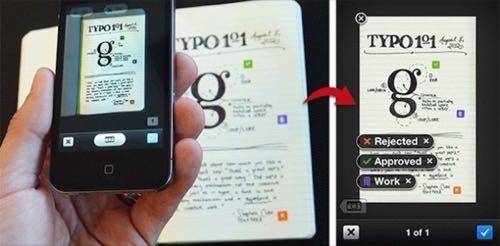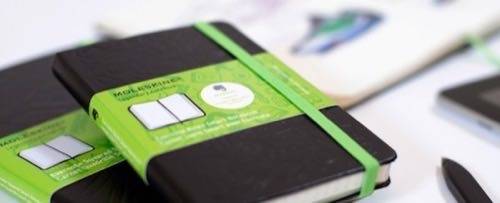
Evernote signed a treaty with Moleskine Friday at the Evernote Trunk Conference, formally declaring a truce in its war on paper. It announced the Evernote Smart Notebook from Moleskine, along with a new version of Evernote for iOS that will bridge the gap that’s familiar to anyone with an urgent need to capture ideas.
Despite Evernote’s efforts to move people to go paperless, Moleskine’s fancy journals are still a booming business. But according to the presentation at the Evernote Trunk Conference, 60% of Moleskine owners also use digital notes. While Evernote has long had optical character recognition built in, so stored photos of printed text are searchable on your computers, there’s still a big divide between our hand-written and digital outboard brains.
See also: Evernote: A 0-to–60 MPH Guide
Today’s update to Evernote for iOS adds a new mode called Page Camera, which is optimized for bringing handwritten pages into Evernote. It fixes the contrast and shadows, so the handwriting is more visibile. That makes the notes more legible to you, but it also enables Evernote to read and search the text.

While this works for any page, the Smart Notebook from Moleskine has some enhanced features. It comes with stickers that enable Evernote’s camera to automatically tag your hand-written notes, so they end up in the right place in your digital archive. The small version of the notebook is $24.95, the large is $29.95, and they ship October 1. They’re available for preorder now, and Evernote Trunk Conference attendees received one after the announcement.

Evernote’s OCR is great at print, but it also has some of the best computer scientists in the field of handwriting recognition behind it. Some of its core team members were on the Apple Newton team and wrote the CalliGrapher handwriting recognition engine. In May, Evernote acquired Penultimate, the best digital handwriting app for iPad, so now that team gets to optimize Evernote’s OCR with data from all that digital handwriting.
To fend off concerns about privacy when storing all these personal notes, CEO Phil Libin stated explicitly that Evernote is “not a big-data company.” User information is private, and it’s only used to optimize the tools themselves. “We want Evernote to be a cognitive aid,” Libin said.

















